A legislative hearing on holding a public vote to amend Washington’s state constitution to enshrine the rights to hunt, fish and trap attracted a lot of attention this afternoon in Olympia, one of a baker’s dozen worth of bills to watch over the coming weeks.
Prime sponsor Senator Keith Wagoner (R-Sedro-Woolley) termed his resolution as “pure a grassroots movement as possible,” one he said that came not from heavyweight national players but from a neighbor he’d hunted with as a teen.

He said his friend was worried about reduced fishing and hunting opportunities as well as the direction of the current state Fish and Wildlife Commission, which was “sometimes ruling in a way that doesn’t seem like they’re increasing opportunities,” contrary to the body’s legislative mandate to maximize them while ensuring the longterm viability of critters and their habitats.
“I think this bill would recalibrate our state on what the point of hunting and fishing is for and all about,” said Wagoner. “For some of us – I’m a casual hunter and fisherman – it’s recreation and connecting with nature. For others, it’s a way to supplement their food when they’re food insecure. And for many of our tribes it’s a more spiritual connection and something that is part of their culture. So I think this at least deserves to go to the people for a vote, and I hope that it would be supported.”
Of the 18 people who spoke in front of the Senate Agriculture, Water, Natural Resources & Parks Committee in person or by Zoom on his Senate Joint Resolution 8208, half said they supported the bill and half were against, while 1,819 signed in in favor and 1,424 were against it.
Trevor Guyton of the Bremerton Sportsmen’s Club spoke to how generations of his family back to sharecropping days had sustained themselves through the activities, but that fishing and hunting could die “by a thousand cuts” if they weren’t protected by the constitution. He said it was “imperative” that they be enshrined as “inalienable rights.”
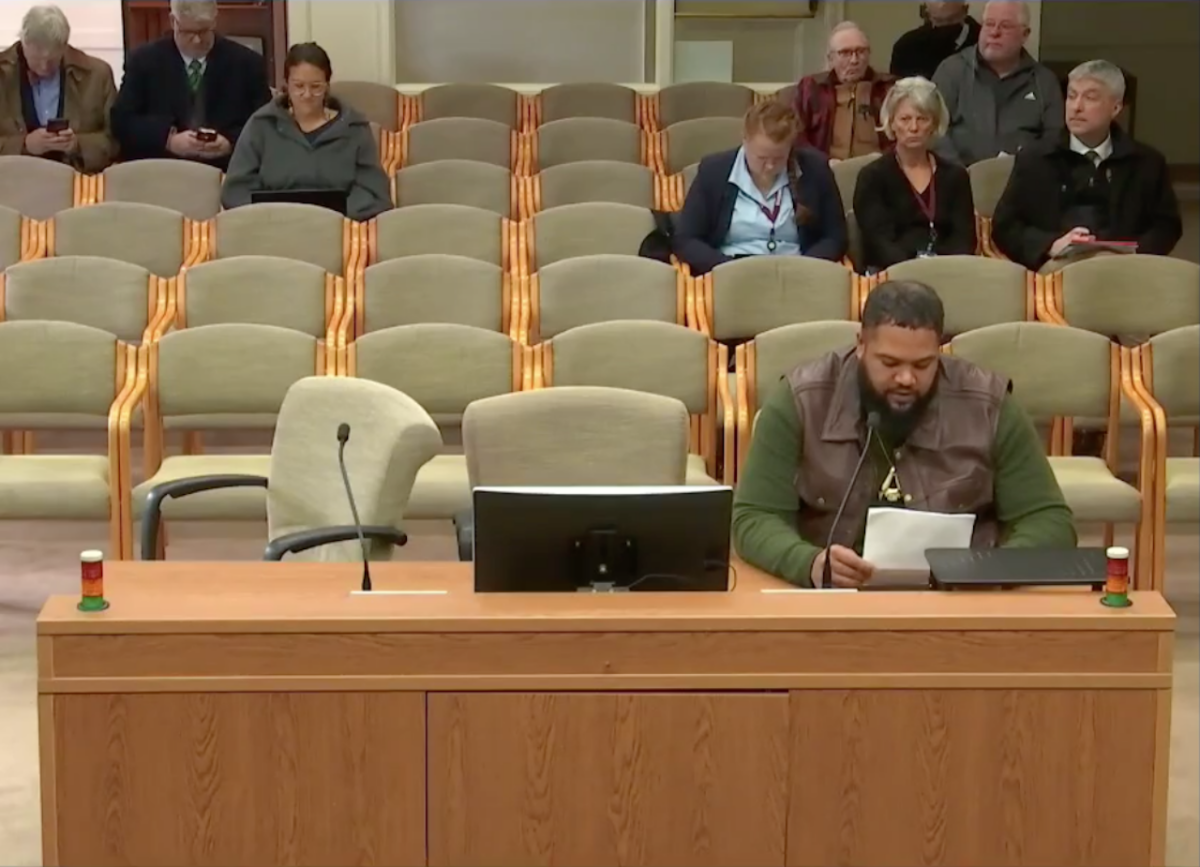
Kelsey Ross of Camano Island and an “adult-onset” hunter gatherer extended that “40,000 generations” deep as she spoke to a human life way stretching back to our origins as a species, leaving it “woven into our DNA” and eliciting a deeper desire to conserve the resources. But she said hunting is threatened in Washington and protections against “radical ballot-box biology” are needed.
“This is not a hobby but the basis of our existence,” Ross said.
Hannah Thompson-Garner of Northwest Animal Rights Network pooh-poohed that, stating hunting was just a hobby that didn’t belong in the state constitution, while David Linn of Ocean Shores said the document shouldn’t be amended for every little right that came along. Linn also pulled the fear card on what including them might lead too – “… a great many species driven to extinction … hunting and fishing would devolve into a free for all … a return to the past when so many species were driven to extinction by unconstrained killing.”
Dan Paul of the Humane Society of the United States said he was opposed to the “far-reaching proposal that will prevent Washington citizens from using our right to advance issues of our own choosing through the ballot-initiative process” – his organization has been behind a few pieces of ballot-box biology over the years – and expressed concern about the resolution’s language as written that hunting and fishing rights would be “subject only to reasonable regulation as prescribed by the Washington state legislature and executive branch.”
Others opposed to the bill said – irony alert!!! – that the amendment would lead to clogged courts from lawsuits filed by sportsmen who might feel fishing and hunting regulations weren’t “reasonable” and a constitutional amendment could bar them from filing their petitions to constrict bear, cougar and other seasons.
They said over and over that fishing and hunting aren’t under threat, but don’t tell Brian Barcus of Clark County that. He noted that in his lifetime he’d lost the right to use bait for bears, run hounds for cougars and use body-gripping traps “due to emotions instead of facts.” He said his “main point” was to protect what was left.
While Claire Loeb Davis of Washington Wildlife First claimed SJR 8208 would “cripple conservation efforts,” Brant McDuff, a conservation historian and economist calling in from New York City, termed fishing and hunting a “sustainable way to contribute” to conservation and that decisions around them should be left to scientists, not the general public.
In an aside during the meeting, committee Chair Kevin Van De Wege (D-Sequim) stated license revenues only provide 15 percent of WDFW’s operating budget, but in reality it’s more like 33 percent because those revenues help leverage federal Pittman-Robertson and Dingell-Johnson Act dollars for the agency.
Mike Herz of Cowlitz County pointed out that hunters are the original conservationists, a need seen a century ago and still needed today. He said that 75 percent of state residents supported hunting.
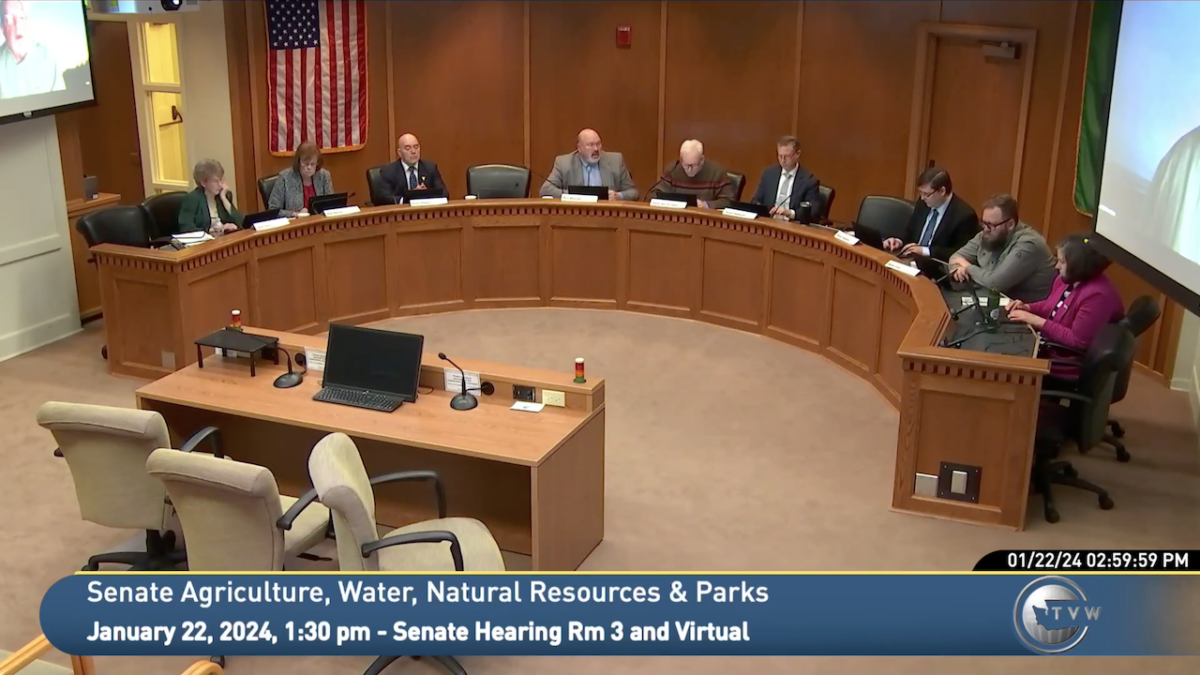
While WDFW representatives did not speak before the Senate committee today, they did submit brief comments on the resolution. Legislative liaison Tom McBride said that while the agency was “cautious” about weighing in something that might go to voters in November, the legislative hearing did provide a platform for brief comments.
“Washington residents who hunt and fish are passionate about these activities – and deserve recognition for their contributions to the conservation of fish and wildlife,” McBride stated in an email submitted to the committee.
“The amendment includes the phrase stating that this new constitutional right is ‘subject only to reasonable regulation.’ Agency rules and actions are already subject to a rational review standard, but there is a risk that courts could impose a more strict standard of review for agency rules and actions that allegedly infringe the new constitutional right. For example, as mandated by federal law and carried out in state statute, individuals are denied hunting and fishing licenses if they are not current on child support, and others lose their licenses based upon prior criminal violations of hunting or fishing regulations. Courts could apply higher scrutiny to those legal consequences,” McBride wrote.
He stated that nearly two dozen other states’ constitutions include right-to-hunt elements, provisions protected over the past two decades, but some “have seen increased litigation raising new claims under the constitutional provisions.”
Along with Senator Wagoner, other SJR 8208 cosponsors include Senators Matt Boehnke (R-Kennewick), Phil Fortunato (R-Auburn), Karen Keiser (D-Des Moines), Mark Schoesler (R-Ritzville), Shelly Short (R-Colville) and Lynda Wilson (R-Vancouver). Previously, Senator Sam Hunt (D-Olympia) was listed as a cosponsor but not longer is.
Today’s hearing will help lawmakers fine tune the bill in committee. The next step could be for a substitute bill to be offered and given a recommendation one way or another from senators on the panel.
To be put on the general election ballot, it would need to pass both the Senate and House by a two-thirds vote but only a simple majority of voters statewide would put it into the constitution.
There can be little doubt that the attempts at reforming Washington fish and wildlife management and the commission we’ve seen the past few years and which I’ve been covering here have led to pushback in the form of this resolution that would amend the state constitution, and the big response today from the wing that stands to gain from those ongoing changes suggests it represents a real danger to their aims.
Considering things further afterwards (and assuming the Senate and House go for it by the required margins), my mind swung around to the question of what a summer and fall campaign in support of the resolution would look like and, more importantly, who would fund it? I saw a lot of individuals in the resolution’s roll call of support, but what I did not see was much organizational involvement beyond Guyton of the Bremerton Sportsmen’s Club, some members of Howl for Wildlife and Duane Inglin of the web-based Fish Hunt Northwest show. But maybe I’m just not looking in the right place in the legislative record or maybe it’s just still early – this bill dropped less than two weeks ago. Anyway, it will be interesting to see how much traction cosponsors Wagoner and Short can rally from their fellow Senate committee members during this short session of the legislature.
—-OTHER BILLS TO WATCH—-
SJR 8208 is far from the only bill to watch in Olympia. Here’s a look at a dozen other fish and wildlife-related pieces of legislation percolating to one degree or another in Washington’s halls of power.
Substitute Senate Bill 5784, “Concerning deer and elk damage to commercial crops.”
Effect: Increases overall state General Fund support from $30,000 – set in 1947 – to $300,000 a year to compensate commercial farmers whose crops are damaged by deer or elk and boosts the amount individual operations can receive from $10,000 to $30,000.
Cosponsors: Senators Kevin Van De Wege (D), Ron Muzzall (R), Mark Mullet (D), T’wina Nobles (D), Keith Wagoner (R) and Judy Warnick (R)
Comment: WDFW-request legislation, this bill was amended in committee and now also includes a three-year pilot study that will radio-collar Southcentral Washington agland elk to give farmers a heads up if hungry herds are sauntering toward their crops so as to more effectively haze them away.
What’s next: Received a do-pass recommendation by Senate Agriculture, Water, Natural Resources & Parks Committee and was referred to the Ways & Means Committee.
________________________________________

SB 5846, “Concerning beaver ecosystem management.”
Effect: Would direct WDFW to come up with a statewide beaver ecosystem management plan, which would stress the role the bucktoothed dam builders play in watersheds and the benefits thereof, as well place lethal removal last in line to education, coexistence and relocation when said critters build said dams in places people don’t necessarily want them.
Cosponsors: Senators Jesse Salomon (D), Marko Liias (D), Liz Lovelett (D), Rebecca Saldaña (D) and Kevin Van De Wege (D).
Comment: The importance of beavers in terms of salmon habitat and stream health is becoming more and more widely acknowledged, with the Tulalip Tribes and some nonprofits strongly invested in harnessing the free labor of Castor canadensis towards that end. The bill follows previous interest from the legislature on the species, while a year and a half ago Washington Fish and Wildlife Commissioner Melanie Rowland wanted WDFW to hold management discussions around the species and temporarily ban trapping until a policy was in place.
During a public hearing on SB 5846 earlier this month, there was concern about impacts on neighboring properties if beavers were left to do their thing on someone else’s land, i.e., raising the water table, as well as vague language around the length of trapping bans around beaver relocation sites. Prime sponsor Senator Jesse Salomon (D-Shoreline) said it was “not envisioned as a no-kill bill.” WDFW signed in in support of the bill, as did the Tulalip Tribes, “assistant beaver wrangler” Mark Heckert of Beaver Creek Environmental Services of Pierce County, and Alexa Whipple of the Methow Beaver Project, among others.
Next steps: Scheduled for an executive session of the Senate Agriculture, Water, Natural Resources & Parks Committee January 25.
________________________________________
SB 5862, “Concerning hunting and fishing licenses for nonresident college students.”
Effect: Would allow full-time college students from out of state but who’ve been in Washington for at least six months to be able to buy fishing and hunting licenses at the same rates as resident scholars of salmon, steelhead, sooty grouse, snow geese, etc. License costs vary, but an annual freshwater fishing runs $29.50 for residents, $84.50 for nonresidents, while a deer tag runs $42.90 and $432.30, respectively.
Cosponsors: Senators Phil Fortunato (R), Jim McCune (R), Mike Padden (R), Judy Warnick (R) and Lisa Wilson (R)
Comment: A fiscal note estimates that WDFW would see fishing license sales revenues increase by $48,000 while hunting license revenues would decrease by $59,670 for a net loss of around $12,000, while costing $16,000 to initially implement, shrinking to $11,000 a year. “It’s all about participation. It’s all about getting that. More participation will offset the costs and benefits,” said prime sponsor Senator Phil Fortunato (R-Auburn) at a hearing on the bill last week. According to Marie Neumiller of the Congressional Sportsmen’s Foundation, who testified in support, 29 other states have similar laws on the books.
Next steps: Sailed out of Senate Agriculture, Water, Natural Resources & Parks Committee with a do-pass recommendation and now in Rules Committee.
________________________________________
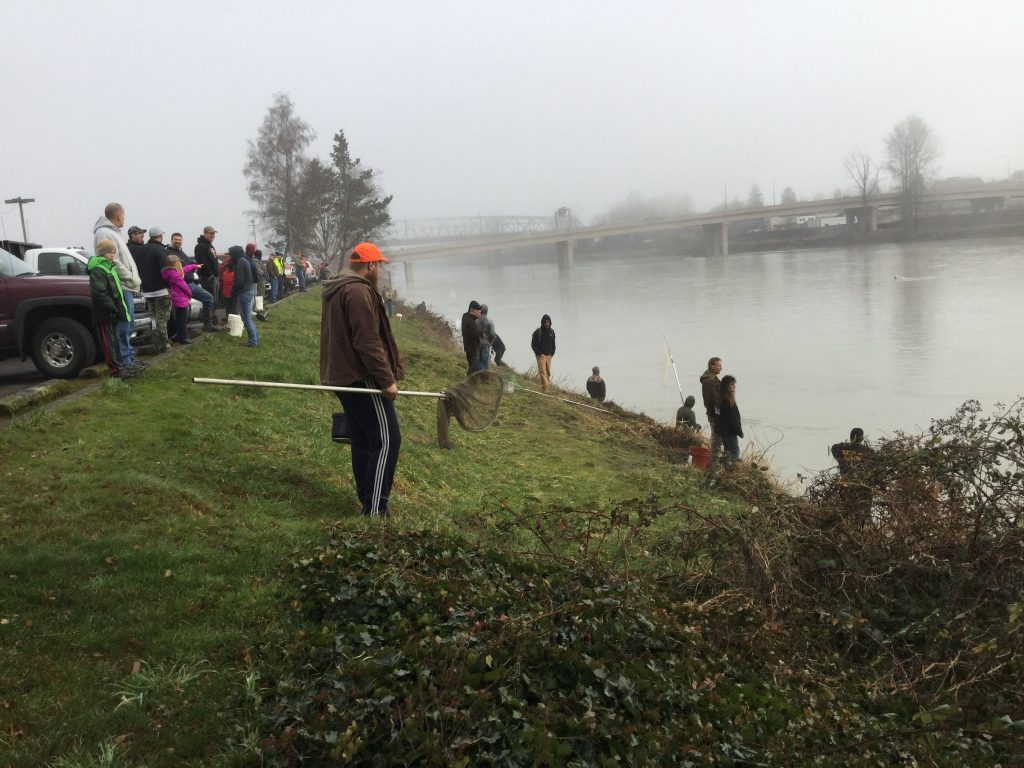
SB 5907, “Providing for recreational licensing of eulachon, crawfish, and carp.”
Effect: Pretty straight forward in that anyone planning to fish for eulachon, also known as smelt, crawfish or carp would need a WDFW recreational fishing license to do so.
Cosponsors: Senators Jesse Salomon (D), Marko Liias (D) and T’wina Nobles (D).
Comment: This is essentially the exact same bill from the 2023 legislative session that made it to the House Rules Committee, except now fattened up with the arguments why to require a license to dipnet the skinny little Endangered Species Act-listed fish that runs up the Lower Columbia, Cowlitz and other tributaries (“to provide angler education and allow for better regulation and monitoring to prevent them from becoming endangered”) and to fish for carp (to “aid in enforcement of illegal fishing where people fishing for regulated species without a required license have claimed to be fishing for carp, thereby negatively affecting the fisheries of other regulated species”). Currently, smelt, carp and crawfish are exempt from licensing required for salmon, steelhead, trout, walleye, bass, etc., etc. Not exactly a WDFW get-rich-quick scheme, as the bill would generate just an estimated $55,000 annually. It was supported by Nello Picinich of Coastal Conservation Association of Washington and WDFW.
Next steps: Scheduled for an executive session of the Senate Agriculture, Water, Natural Resources & Parks Committee on Thursday, January 25.
________________________________________
SB 5892, “Concerning diseased elk.”
Effect: Begins a three-year pilot program allowing people who see elk with severe limps to shoot them “without regard to hunting season dates and areas and no tag is required,” and make efforts to see the meat doesn’t go to waste.
Cosponsors: Senators Keith Wagoner (R), Phil Fortunato (R), Judy Warnick (R) and Lisa Wilson (R).
Comment: Senator Wagoner billed this as a way to more quickly and humanely lethally remove elk stricken with treponeme-associated hoof disease occurring in wapiti across Washington versus how witnesses now need to go online to report their sighting. It’s supported by some Skagit County farmers and the county commission, but WDFW is not in favor, pointing to the potential for bad actors and headaches for county prosecutors, and impacts on regulated hunters, and said the agency has already developed a lethal removal protocol it uses with area tribes. The Skagit Valley and nearby environs are home to around 1,600 elk, with those along the river both a blessing and not as much of a blessing.
Next steps: Nothing scheduled at this moment.
________________________________________
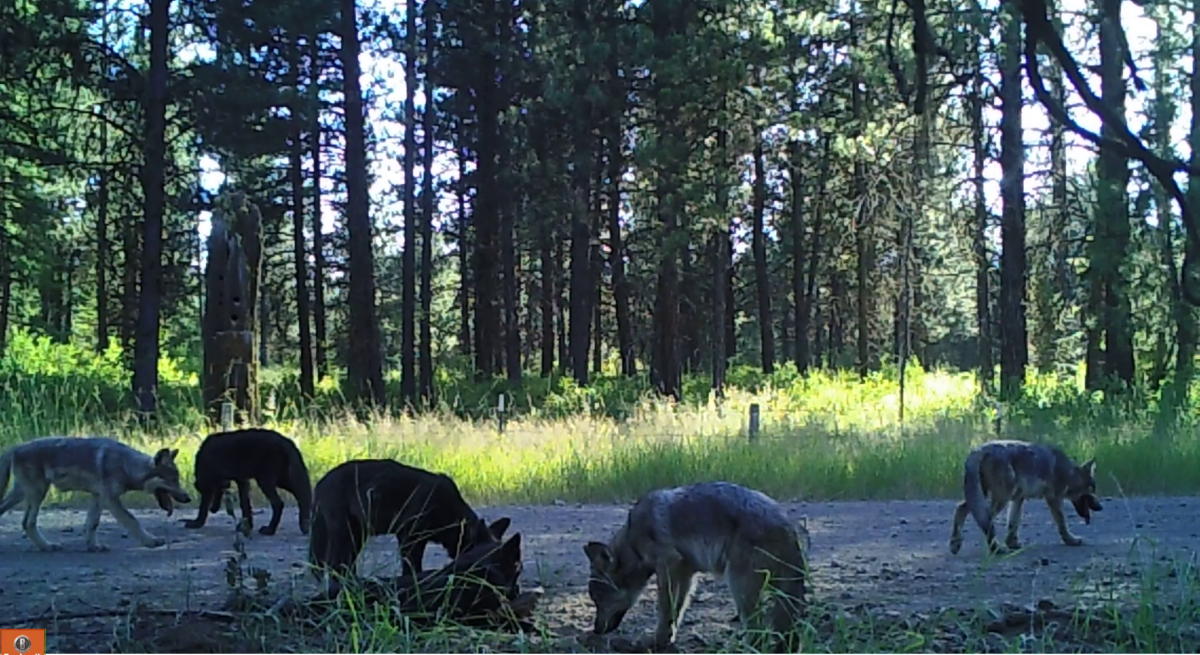
SB 5939, “An act relating to protecting livestock from wolf predation.”
Effect: Sets up a three-year pilot program to test the effectiveness of shooting the first wolf that returns to a depredation site and requires WDFW to report back on it to the legislature by December 2027.
Cosponsors: Senators Keith Wagoner (R), Kevin Van De Wege (D), John Lovick (D) and Mark Schoesler (R).
Comment: Senator Wagoner argued that it could provide “immediate feedback” to a pack that had attacked livestock and the wolves would “learn from that.” Stevens and Ferry County wildlife officer Jeff Flood termed it a potentially “useful deterrent” because he said current nonlethal tools had “reached sunset,” while Kathy McKay of the K Diamond K Guest Ranch intimated that not being able to stop a series of depredations at her ranch south of Republic had led to a “huge financial loss” for her business due to customer cancellations.
WDFW’s Julia Smith said that while she supported increasing rancher autonomy in responding on the wolf front, there was also a fine line between the idea behind the bill and hunting over bait, which in this particular case would violate state rules. The bill was opposed by Washington Wildlife First, which has been trying to straight-jacket WDFW lethal removals and said this one would cause “gratuitous killing of wolves.”
Next steps: Nothing scheduled at this moment.
________________________________________
SB 6147, “Protecting and preserving the Puget Sound salmon purse seine fishing industry.”
Effect: Directs WDFW to establish a buyback program to reduce the number of Puget Sound purse seine netting licenses in the limited-entry fishery from 71 to 40 and appropriates $5 million from the state General Fund towards that end.
Sponsors: Senators Sharon Shewmake (D), Manka Dhingra (D), Jeff Holy (R), John Lovick (D), T’wina Nobles (D), Rebecca Saldaña (D) and Judy Warnick (R).
Comment: Piggybacking on past efforts to reduce nontribal commercial gillnet licenses on the Lower Columbia, Grays Harbor and Willapa Bay, this bill would pay $150,000 to retire each license, which allows holders to fish primarily for pinks, chums and sockeye, among other stocks, in the San Juan Islands, Hood Canal and central Puget Sound. While CCA and Picinich pushed the Columbia buyback, not so much this bill, but former WDFW Fish and Wildlife Commissioner Bob Kehoe of the Purse Seine Vessel Owners’ Association called it a “voluntary right-sizing of the fleet,” which has too many boats and not enough fish to catch given ESA issues, treaty fishery obligations and very limited lottery openings for chums, he said.
Next steps: Had a hearing today in Senate Agriculture, Water, Natural Resources & Parks Committee and is scheduled for an executive session, January 25.
________________________________________
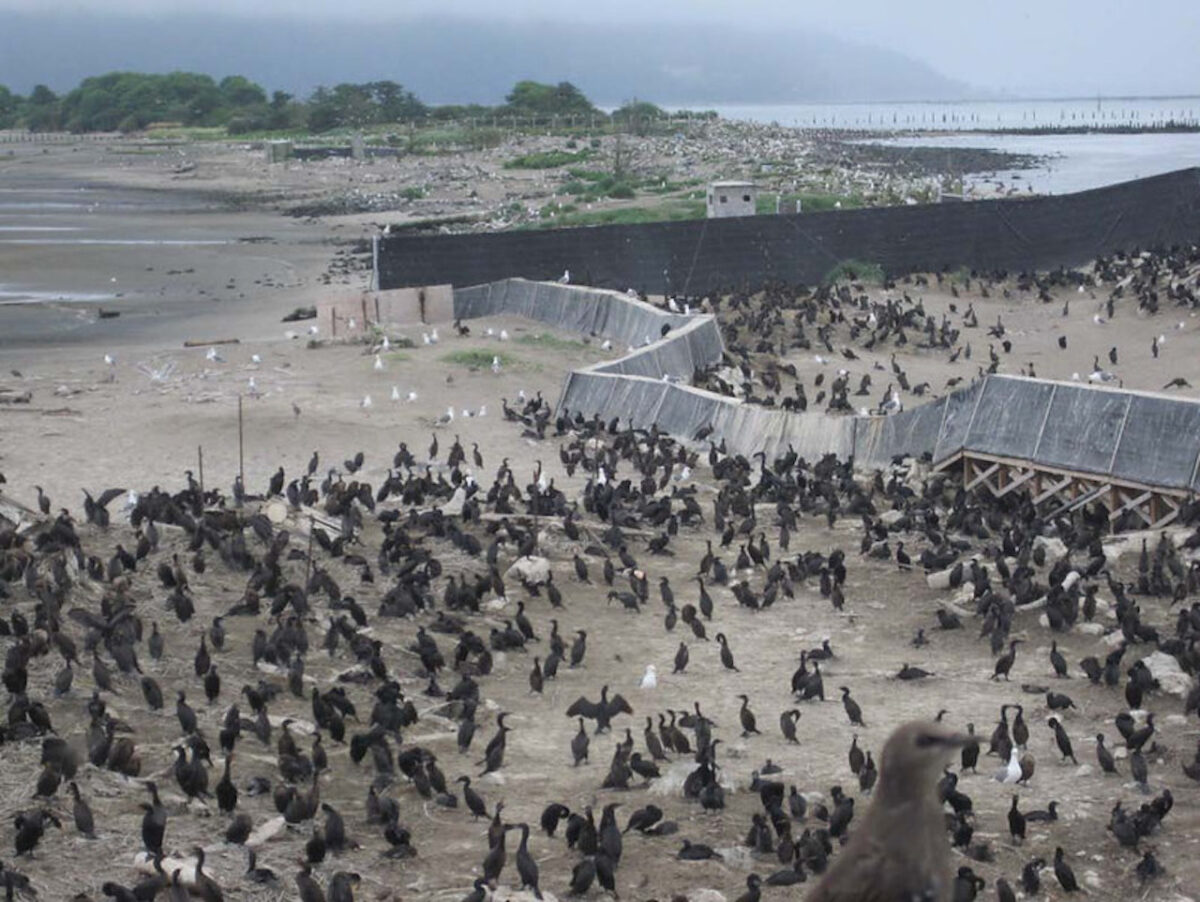
House Bill 2293, “Studying the effects of avian predation of salmon.”
Effect: Sets up a WDFW “avian salmon predation work group” to identify all bird species that eat Chinook, coho and other stocks, figure out if those flocks are overpopulated and how to remedy that.
Cosponsors: Representatives JT Wilcox (R), Mike Chapman (D), Joel Kretz (R), Tom Dent (R), Andrew Barkis (R) and Stephanie Barnard (R).
Comment: Smolt-eating birds were in the news over the weekend as The Seattle Times detailed the cormorants that have set up a rookery on the Astoria-Megler Bridge after being chased off East Sand Island, possibly increasing their overall fish consumption.
Next steps: Scheduled to be heard by the House Agriculture and Natural Resources Committee on Friday, January 26.
________________________________________
HB 2341, “Directing the University of Washington to conduct a study on the cumulative effects of offshore wind development on the oceanographic processes of the Pacific Ocean.”
Effect: The bill summary above states it pretty well, but Pacific processes include “tides, waves, and currents; and, in turn, how changes in those processes could affect the broader marine ecosystem” such as upwellings and whether offshore turbines would become a magnet for marine life or chase it away, according to a nonpartisan legislative staff bill report.
Cosponsors: Representatives Larry Springer (D), Mike Chapman (D), Melanie Morgan (D), Drew Stokesbary (R), Joe Timmons (D) and Alex Ramel (D).
Comment: With the big federal push to harness wind energy, this bill is supported by seafood companies and an organization that includes coastal charter associations.
Next steps: Had a hearing before the House Agriculture and Natural Resources Committee last week.
________________________________________
HBs 2423 and 2424, “Concerning gray wolf management” and “Updating cooperative agreements between the state and federally recognized tribes for the successful collaborative management of Washington’s wildlife resources.”
Effects: The former bill would direct WDFW to develop a regional wolf management plan in the federally delisted area of Washington with help from a work group composed of ranchers, counties, range riding organizations and conservation nonprofits and facilitated by a third-party neutral. Among the plan’s goals would be to speed up WDFW lethal removals following depredations. The latter legislation would see WDFW align wolf management on what’s known as the “North Half” with how the Colville Tribes manage the species on their reservation, or South Half.
Cosponsors: 2423: Representatives Joel Kretz (R), Larry Springer (D), Joe Schmick (R) and Tom Dent; 2424: Joel Kretz (R), Debra Lekanoff (D), Larry Springer (D), Joe Schmick (R), Tom Dent (R) and Mike Chapman (D).
Comment: Representative Joel Kretz, prime sponsor of both bills and a Republican horse breeder from the area, termed them “a modest attempt to restore some equity in wolf management, recognize the challenges in Northeast Washington and give those most impacted some input into wolf management.”
Next steps: Both will have hearings before the House Agriculture and Natural Resources Committee on Friday, January 26.
________________________________________
HB 2434, “Eliminating the fish and wildlife commission in order to redirect efforts towards fishing and hunting culture for tribal and nontribal persons.”
Effect: Would dissolve the Fish and Wildlife Commission and leave the director – appointed by the governor with the consent of the Senate and House – in charge of WDFW, fishing, hunting, etc.
Sponsor: Representative JT Wilcox (R).
Comment: The Deep South Sound Republican’s bill says the current commission has “failed” to abide by its legislative mandate to maximize fishing and hunting opportunities while ensuring healthy critter populations and has been ignoring WDFW staff recommendations and “letting special interests dictate” the agency’s direction. Wilcox also acknowledges that he doesn’t believe it will pass and reportedly said he introduced it to have a conversation about the commission’s course. Previously, it was Democrats who were looking to zero out the Fish and Wildlife Commission.
Next steps: Nothing scheduled at this moment.




